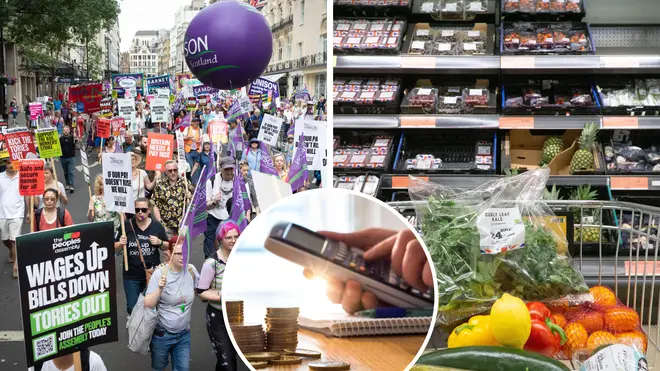
Ian Payne 4am - 7am
17 August 2022, 07:06 | Updated: 17 August 2022, 09:43

Inflation has soared to a 40-year high as the UK's cost of living crisis worsens.
The Consumer Prices Index rate of inflation rose by 10.1 per cent in the 12 months to July 2022, up from 9.4 per cent in June, according to the Office for National Statistics (ONS), putting further strain on under-pressure families across the UK.
It is the highest level since 1982, and a bigger jump than was expected.
Read more: Workers suffer biggest drop in real pay since records began as inflation continues to soar
The increase was largely down to food prices and staples including toilet rolls and toothbrushes, the ONS said.
Chancellor Nadhim Zahawi said he understood that "times are tough" and said the government was "helping where we can".
He added that getting inflation under control was his "top priority".

Iain Dale speaks to food charity boss as record numbers skip meals
ONS chief economist Grant Fitzner said: "A wide range of price rises drove inflation up again this month.
"Food prices rose notably, particularly bakery products, dairy, meat and vegetables, which was also reflected in higher takeaway prices.
"Price rises in other staple items, such as pet food, toilet rolls, toothbrushes and deodorants, also pushed up inflation in July.
"Driven by higher demand, the price for package holidays rose, after falling at the same time last year, while air fares also increased.
"The cost of both raw materials and goods leaving factories continued to rise, driven by the price of metals and food respectively."
Read more: Thames Water imposes hosepipe ban on 15 million customers
Read more: Survivors of infected blood scandal awarded interim payments after 40-year battle
It comes after the ONS found workers were suffering the biggest slump in real pay since records began in 2001, as wages continued to lag behind inflation.
Figures released on Tuesday showed here was a 4.1 per cent drop in regular pay for employees once CPI inflation was taken into account, although there was also an increase in the number of people in work.
ONS director of economic statistics Darren Morgan said: "The number of people in work grew in the second quarter of 2022, whilst the headline rates of unemployment and of people neither working nor looking for a job were little changed.
"Meanwhile, the total number of hours worked each week appears to have stabilised very slightly below pre-pandemic levels.
"The real value of pay continues to fall.
"Excluding bonuses, it is still dropping faster than at any time since comparable records began in 2001."

Stark warning on cost of living crisis
The measure had been expected to reach 9.8 per cent, according to an average of analysts' estimates calculated by Pantheon Macroeconomics.
It is the first time since February 1982 that inflation is in double digits, when it reached 10.4 per cent.
It is also a massive jump from the 9.4 per cent inflation in June.
Watch: Iain Dale left shaken as caller shares harrowing battle against poverty
Inflation is expected to fall back a little in August; however, according to estimates it could soar to 13.3 per cent in October when the energy price cap rises again.
The Bank of England thinks this could push the UK into a recession.

Caller moved to Germany because of extortionate childcare costs
Mr Zahawi said: "I understand that times are tough, and people are worried about increases in prices that countries around the world are facing.
"Although there are no easy solutions, we are helping where we can through a £37 billion support package, with further payments for those on the lowest incomes, pensioners and the disabled, and £400 off energy bills for everyone in the coming months.
"Getting inflation under control is my top priority, and we are taking action through strong, independent monetary policy, responsible tax and spending decisions, and reforms to boost productivity and growth."